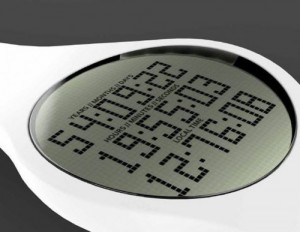When will you die? The question is usually sparked by a powerful film or dream – and even then it doesn’t resonate for long. Sometimes it takes the passing of a loved one, or a brush with Death at an intersection to make us really act and reflect on the question with consequence. Indeed, constantly being on “death watch” just isn’t something Western humans live with on daily basis; we’re far from the hunter-gatherer days of living just to survive. The most pressing question of my day is usually wondering, is recycling day today? Or tomorrow?
“…constantly being on “death watch” just isn’t something Western humans live with on daily basis; we’re far from the hunter-gatherer days of living just to survive.”
It’s a tangible worry. The trash is something we can touch and relate to in our quotidian life; Death is something reserved for late night tossing-and-turning. But Swedish inventor Frederik Colting wants to change all that with his creation of Tikker.
Colting has just introduced Tikker to the public as a device that calculates the time of your death, based on basic knowledge of your health. Many are calling it the “Death Watch” because it takes the form of a wrist-watch that keeps you updated on the years, months, days and seconds remaining in your life. Tikker already has thousands of preorders for its April release, all of which are wondering the question, “When will I die?”
But will wearing Death on your sleeve become a positive influence on the psyche? NPR pointed out that “the work of Jeff Greenberg, Sheldon Solomon and Tom Pyszczynski — grandfathers of an idea in social psychology called terror management theory — has shown that thinking about death [can make us] xenophobic.” When a person feels threatened, they have an instinct to grasp onto what they know is familiar and expel anything threatening that normalcy. If this is the case, Tikker could catalyze its buyers into living an introverted, un-empathetic lifestyle.
But Tikker wasn’t created to instill fear into its buyers, says Colting. Indulging the population in the morbid fascination of their estimated time of death was far from the Swede’s mind. Rather, Colting hoped to create a device that inspires better appreciation of the present through an understanding of our inevitable end. In fact, he prefers to call Tikker the “Happiness Watch.”
“Tikker could catalyze its buyers into living an introverted, un-empathetic lifestyle.”
It’s true that there’s something about the utilization of numbers that can inspire humans to make changes in their lives. Jenny Davis of social science site The Society Pages points out that “Self-quantifiers utilize technologies to tell themselves, about themselves. The information gleaned through self-quantification practices and technologies are meant to facilitate mindfulness, which facilitates control, which facilitates change in a desired direction.”
Tikker could thus be a push in the right direction for those who want to start planning for the end of life, but can’t motivate themselves to do so.
“…there is something about the utilization of numbers that can inspire humans to make change in their life.”
Removing Death as a cultural taboo means bringing it into our everyday conversation. In this sense, Tikker is not so much about “When will I die?” as it is “How will I take advantage of today?” It is a fear-inspired misconception that talking about Death is inherently morbid; we have to remember that individual and group perception affects the role an object like Tikker can play in our life.
And at the end of the day – at the end of your life – it’s up to you.
Will you be preordering Tikker? Why, or why not? We look forward to your comments below.
Related SevenPonds Articles:
- Are your parents aging? A new expectancy calculator reveals the number of times you have left to see see mom and dad. Read about it here.
- Discover the Cemetery Skyscraper in Oslo, Norway.
- Learn about how you could be transformed into rain after you die here.

 Tikker: For Those Wondering, “When Will I Die?”
Tikker: For Those Wondering, “When Will I Die?”





 Our Annual Seven Holiday Gifts for Someone Who Is Grieving, 2024 Edition
Our Annual Seven Holiday Gifts for Someone Who Is Grieving, 2024 Edition
 “Making Mobiles” by Karolina Merska
“Making Mobiles” by Karolina Merska
 “Hands Up to the Sky” by Michael Franti & Spearhead
“Hands Up to the Sky” by Michael Franti & Spearhead















We were all debating whether or not we’d wear this watch. Opinion was divided. Personally I see it as a novelty however I like the intended message. Whatever you need to remind you to live life to the fullest is what matters!
Report this comment
The intended message is beautiful, but I agree it could be taken both positively and negatively. It would inspire many to live life less cautiously but make others feel stressed with a constant reminder of a time constraint. All perception!
Report this comment
It is believed that only god knows when some one has to come & when to leave. If modern science is sure to know the exact time date & place than matter of appreciation. Any authentic agency confirming this claim. What will be the future of the Life insurance co.If it is true than every Supreme Court should make the ruling that every politician particularly to the state heads.
Report this comment